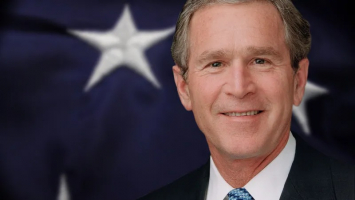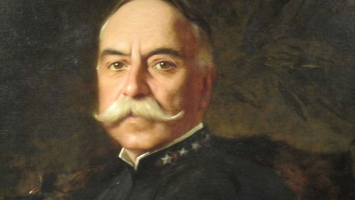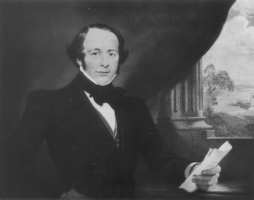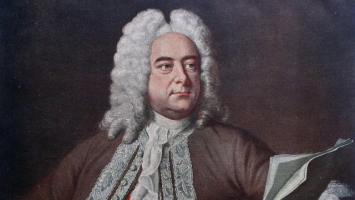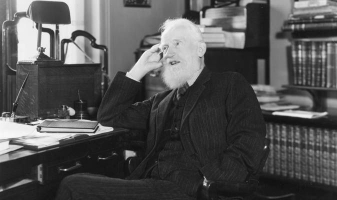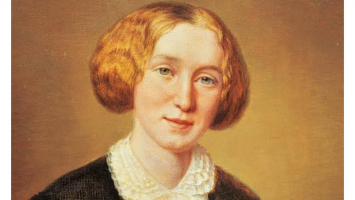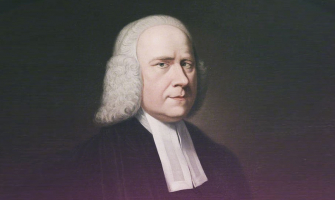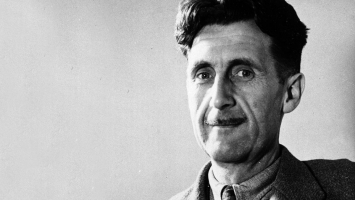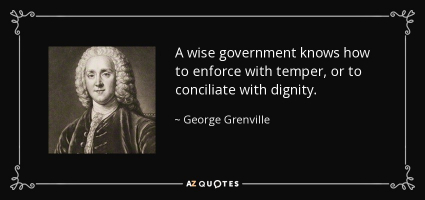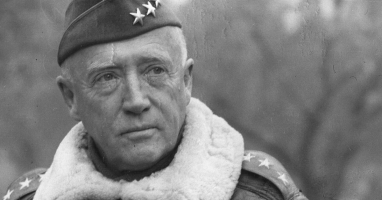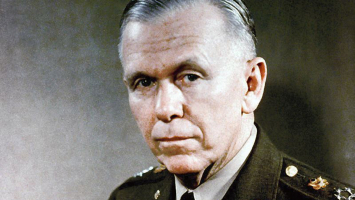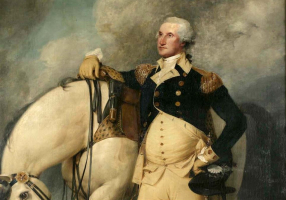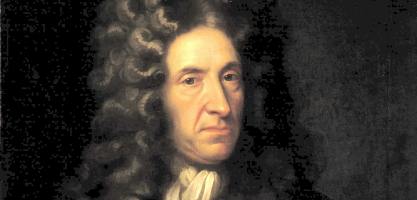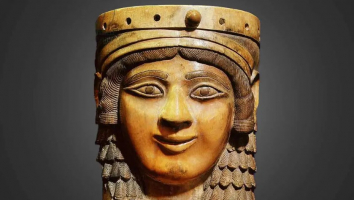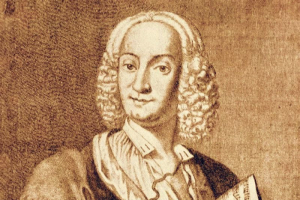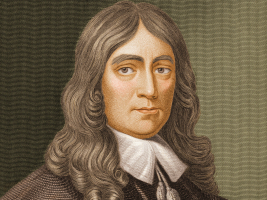Top 10 Facts about George W. Bush
George Walker Bush, an American politician who was born on July 6, 1946, presided over the country as its 43rd president from 2001 to 2009. George W. Bush, the ... read more...son of George H. W. Bush and a former Republican governor of Texas, personified the post-Cold War triumphalism that stressed US dominance in the world. Let's explore more about him through some facts about George W. Bush!
-
The first fact about George W. Bush is that he used to serve in millitary. Bush received his commission with the Texas Air National Guard in May 1968. He was stationed in Houston, where he flew Convair F-102s with the 147th Reconnaissance Wing out of the Ellington Field Joint Reserve Base, following two years of training in active-duty service. Detractors, such as former Democratic National Committee Chairman Terry McAuliffe, have claimed that Bush received preferential treatment because of his father's political position as a member of the House of Representatives. They have pointed to the fact that Bush was chosen as a pilot despite receiving poor marks on the pilot aptitude test and showing erratic attendance. The Texas Air National Guard service records for Bush were disclosed by the Department of Defense in June 2005 and are still available in its official archives.
He trained with the Alabama Air National Guard's 187th Fighter Wing in late 1972 and early 1973. He had relocated to Montgomery, Alabama, to assist Republican Winton M. Blount in his failed Senate campaign. Bush's ability to fly was prohibited in 1972 because he skipped a planned physical. In 1974, Bush received a commendable discharge from the Air Force Reserve. He is still the most recent President to have participated in the American military. In the presidential elections of 2000 and 2004, his military past emerged as a campaign topic.
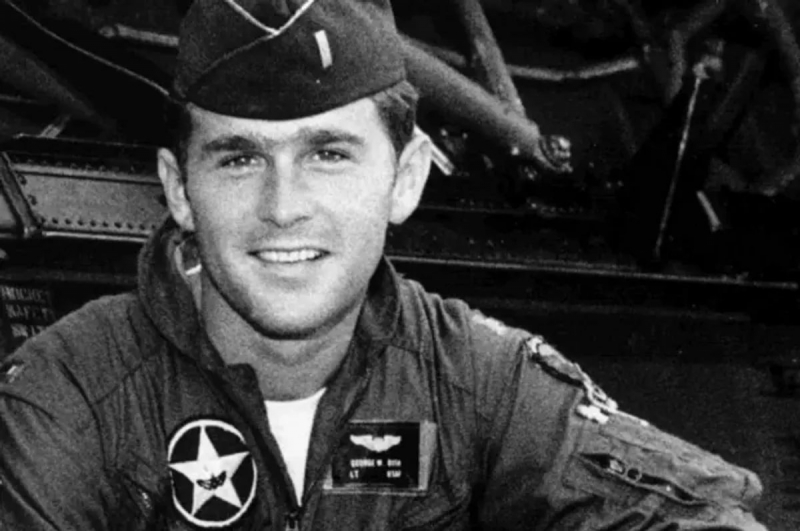
Photo: Salon.com 
Photo: BBC -
Bush worked in the energy sector after earning his MBA from Harvard Business School in 1975, and he later joined the Texas Rangers baseball team as a co-owner. At the same time as his brother Jeb ran for governor of Florida in 1994, Bush announced his bid for the Texas governor's office. His campaign centered on four issues: tort reform, crime reduction, education reform, and welfare reform. Karl Rove, Joe Allbaugh, and Karen Hughes served as Bush's campaign advisors.
After easily defeating the incumbent Democratic governor Ann Richards in the Republican primary, Bush faced her. Bush promised to sign a law allowing Texans to apply for concealed carry permits during the campaign. Richards had vetoed the bill, but after becoming governor, Bush signed it into law. The Atlantic and other publications linked Karl Rove to the lesbian story, although Rove denied any involvement. Bush defeated Richards in the general election by 53.5% to 45.9%.
During his tenure as governor, Bush doubled state expenditure on K–12 education and pushed through Texas's highest tax cut, $2 billion, using a budget surplus. He increased government support for nonprofits that educate people about the risks of alcohol and drug abuse and work to end domestic violence. His detractors said that Texas had a poor environmental record during his administration. His initiatives to increase teacher pay and elevate academic exam scores were cited by supporters. Additionally, he raised the amount of offenses for which juveniles might get jail sentences and approved more executions than any other governor in American history's modern era.
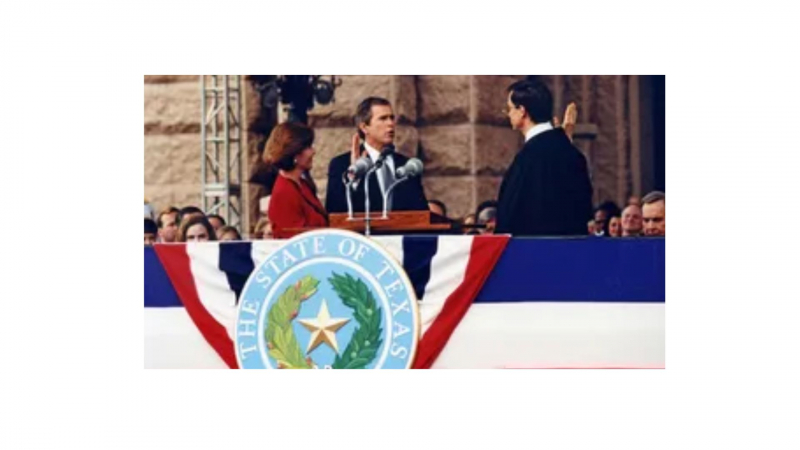
Photo: Encyclopedia Britannica Photo: KPRC Click2Houston -
Next one in the list of facts about George W. Bush is that the canceled Florida recount was crucial to Bush's victory. In the year 2000, Republican George W. Bush defeated Democratic Vice President Al Gore to win the presidency of the United States. The Bush v. Gore ruling by the Supreme Court, which prevented a recount in Florida, was crucial in the closely contested election. The Florida Supreme Court ordered a statewide recount of all undervotes—more than 61,000 ballots that the voting machines missed—on December 8. The Bush campaign formally requested that the U.S. Supreme Court postpone the ruling and put an end to the recount. Justice Antonin Scalia encouraged his colleagues to grant the stay right away because he was certain that the manual recounts being conducted in Florida's counties were invalid.
On December 9, the Court's five conservative justices accepted Bush's request for a stay, noting the "irreparable harm" that could result from the recounts casting "an unnecessary and unwarranted cloud" on Bush's legitimacy. Scalia made this argument. Justice John Paul Stevens expressed disapproval in his dissent, arguing that "counting every duly cast vote cannot entail irreparable harm." On December 11, oral arguments were scheduled.
The U.S. Commission on Civil Rights determined that the fairness of elections in Florida, a state led by brother Jeb Bush, and in particular the protection of black citizens' rights, were "primarily responsible for the wide range of difficulties in Florida during the 2000 election." Bush was the fourth president to be chosen without a majority of the popular vote; the first was in 1888. In 2016, Donald Trump also lost the popular vote.

Photo: Politico 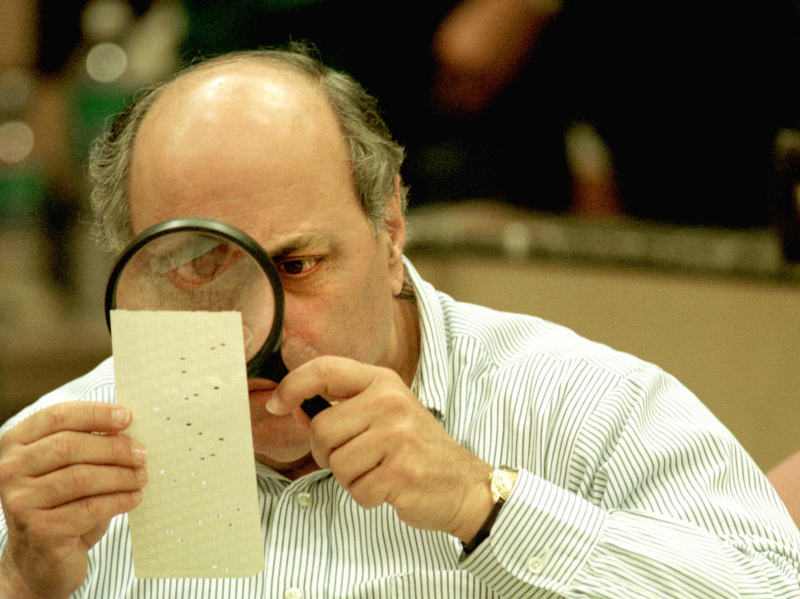
Photo: NPR -
Bush signed the Patriot Act after the 9/11 terrorist attacks. This gave law enforcement more surveillance power, allowed them to examine people's homes and places of business without their knowledge or consent, and allowed for the detention of immigrants without charge or trial for an indefinite period of time. Several of the act's provisions were eventually declared unlawful by federal courts.
Following the September 11 attacks, the Bush administration sent Congress a draft of legislation intended to increase the government's ability to monitor, look into, and jail suspected terrorists. On October 11, the final Senate legislation, the Uniting and Strengthening America (USA) Act, was approved (96-1). The Uniting and Strengthening America (USA) Act was passed by the House on October 12 (337-79), largely based on the text of the Senate's USA Act. The USA PATRIOT Act, a compromise measure submitted by the House on October 23 and approved the next day (357–66), was passed. On October 25, the Senate passed the House bill (98-1) without making any changes, and the next day Bush signed it into law.
Beginning in 2001, the USA PATRIOT Act's various components were contested in court. The U.S. Supreme Court ruled in Holder v. Humanitarian Law Project (2010) that the act's definition of "material support," which included expert advice or aid, did not infringe on the rights to free speech and association.
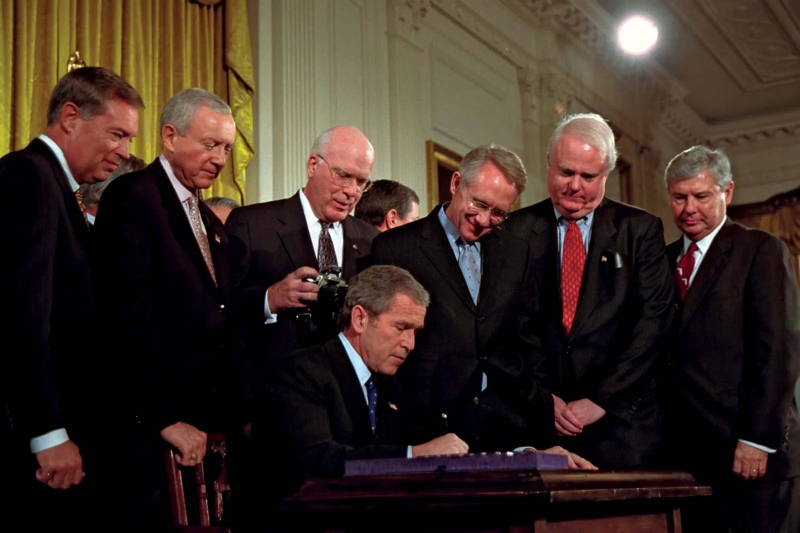
Photo: Ecyclopedia Britannica 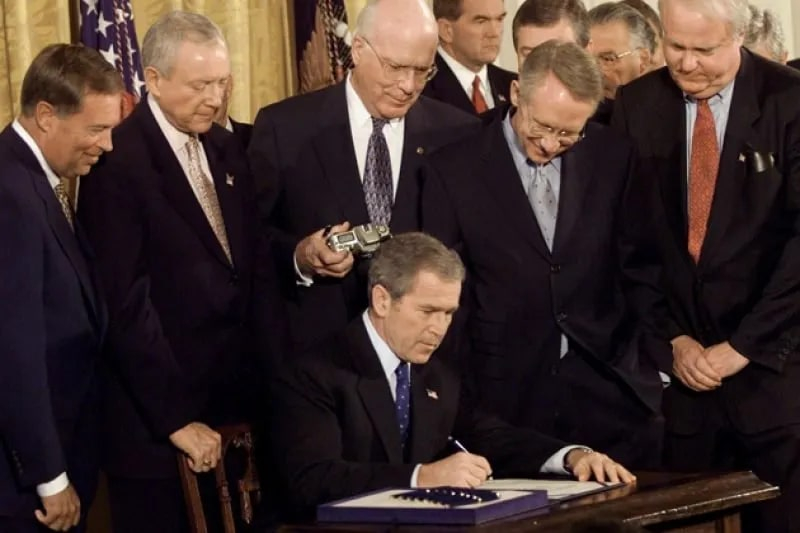
Photo: SOFREP -
Al-Qaeda, which was in charge of the attacks in New York and Washington, D.C. on September 11, 2001, was the organization that was targeted in the late 2001 invasion of Afghanistan by the United States and its allies. This was a part of the global war on terrorism that Bush declared on September 20, 2001, before a joint session of Congress. The United States and its allies attempted to reorganize the Islamic world through force during this time. The Bush Doctrine was the name given to the George W. Bush-favored unilateral military action.
Bush ordered the invasion of Afghanistan to overthrow the Taliban government after the Taliban government in Afghanistan refused to cooperate with Osama bin Laden. He claimed that North Korea, Iran, and Iraq made up an "axis of evil" that was "arming to threaten the peace of the world" and "posed a grave and growing danger" in his State of the Union address on January 29, 2002. The Bush administration claimed the authority to fight preemptive or preventive war as well as the intention to do so. This served as the foundation for the Bush Doctrine, which eroded the previously unheard-of levels of domestic and worldwide support for the United States after the September 11 attacks. That's all about the fifth fact about George W. Bush Toplist want to share.
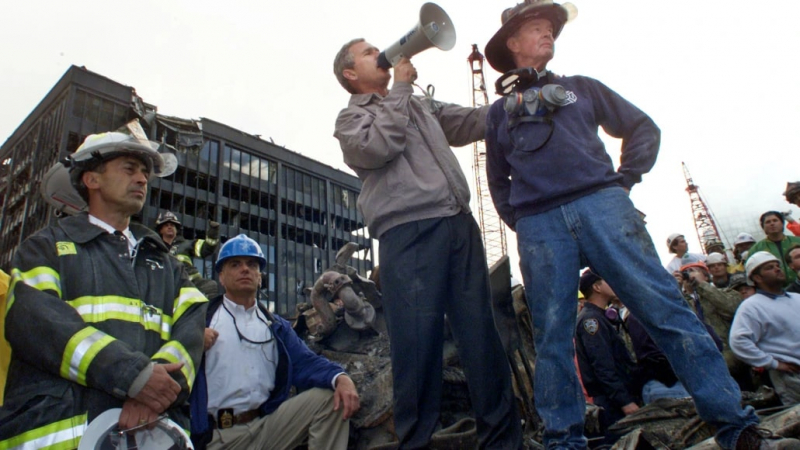
Photo: Brookings Institution Photo: PBS Newshouse -
Beginning with his State of the Union address on January 29, 2002, Bush began to publicly focus attention on Iraq, which he characterized as being a member of a "axis of evil" associated with terrorists and posing "a grave and growing danger" to U.S. interests due to its acquisition of WMDs. CIA files from the second half of 2002 said that Saddam Hussein intended to restart nuclear weapons projects, had failed to account for Iraq's biological and chemical weapons, and had some missiles with a longer range than permitted by UN sanctions. President Bush would soon come under heavy fire for allegations that the Bush administration misrepresented or overstated the threat and proof of Iraq's capability to produce WMDs.
Bush sparked a diplomatic crisis by pleading with the UN to uphold Iraq's disarmament demands in late 2002 and early 2003. The United States advised UN weapons inspectors in Iraq in November 2002 to leave the nation four days before the U.S. invasion, ignoring requests from Hans Blix and Mohamed ElBaradei for more time to finish their work. The United States initially requested a UN Security Council resolution authorizing the use of force, but it abandoned the request after facing vehement opposition from a number of nations. Political commentators had questioned and refuted the Bush administration's assertion that the War in Iraq was a component of the War on Terror.
George W. Bush announced the invasion of Iraq in 2003 with strong support from the American public, citing allegations that Iraq had WMDs and was home to Al Qaeda. the start of the Iraq War. A 2004 United States Senate study stated that the pre-war intelligence on Iraq was inaccurate, among other criticisms of the justification for the war.
Even though the initial invasion was short-lived, the ten-year War in Iraq caused the 2013–17 War in Iraq and resulted in the deaths of hundreds of thousands of civilians. In front of a banner reading "Mission Accomplished," President Bush triumphantly declared the United States' victory in Iraq on May 1, 2003, after an aircraft had landed on the USS Abraham Lincoln.
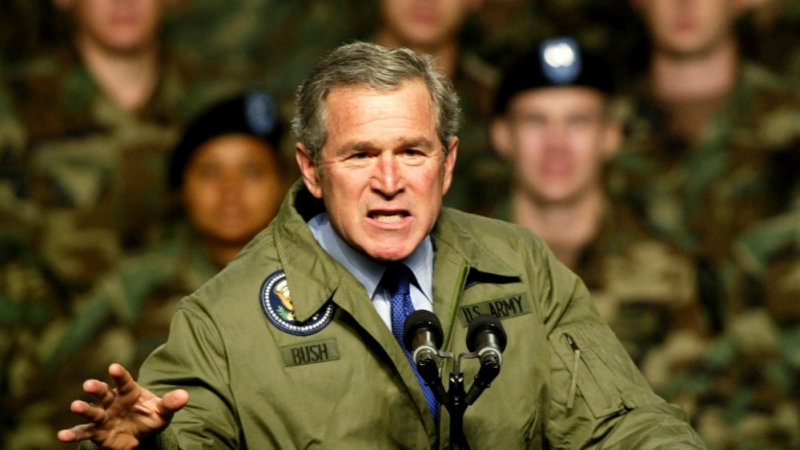
Photo: AI Jazeera Photo: AP Archive -
Bush made two successful appointments to the Supreme Court is the following fact about George W. Bush. Bush defeated Democratic senator John Kerry in the 2004 election to win a second term as president. While Kerry criticized the war in Iraq, Bush's campaign placed a high priority on the fight against terrorism. Bush secured a narrow victory. Bush appointed John Roberts and Samuel Alito to the Supreme Court during his second term. Bush nominated federal appellate judge John Roberts on July 19, 2005, after Associate Justice Sandra Day O'Connor announced her retirement on July 1. However, on September 5, after Chief Justice William Rehnquist passed away on September 3, Bush replaced O'Connor with Roberts as the nominee for the position of Chief Justice of the United States. On September 29, 2005, the Senate confirmed him.
John Roberts, a federal appellate judge, was nominated by Bush on July 19, 2005, following Associate Justice Sandra Day O'Connor's July 1 retirement announcement. On September 5, however, Bush nominated Roberts in place of O'Connor as the candidate for the role of Chief Justice of the United States when Chief Justice William Rehnquist passed away on September 3. He was approved by the Senate on September 29, 2005.
These nominations fulfilled campaign promises and had a long-lasting effect on the nine members of the Supreme Court, who are appointed for life. The battles in Afghanistan and Iraq went on in the meantime. By November 2006, the Democrats had taken control of both houses of Congress, in part because of this. When the Great Recession started in December 2007, Bush was in office.
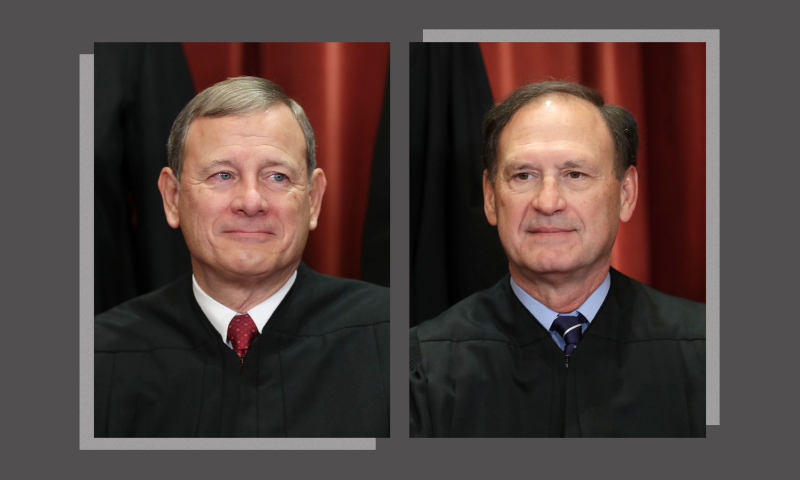
Photo: Wall Street Journal 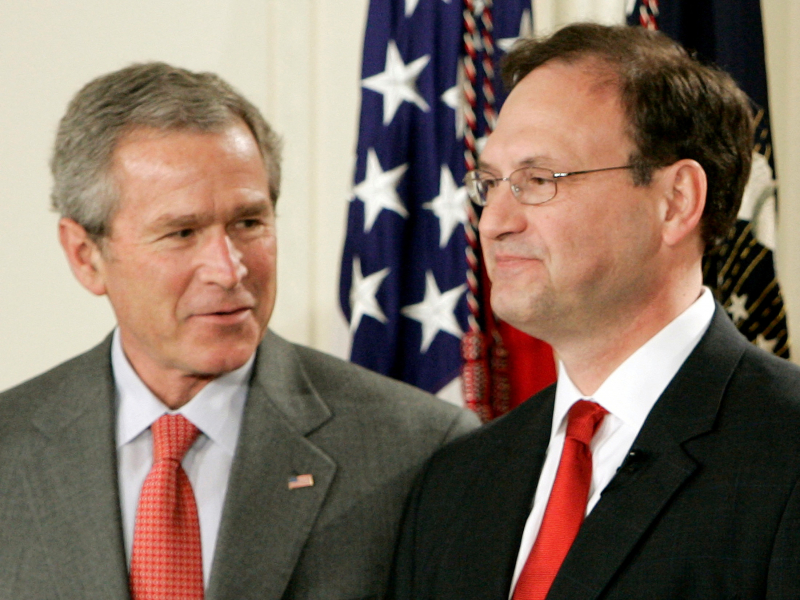
Photo: Reuters -
Bush received harsh criticism for the way the government handled one of the biggest natural catastrophes in US history, Hurricane Katrina. Before and immediately after the hurricane that devastated the Gulf Coast on August 29, 2005, Bush continued his vacation. Hurricane Katrina occurred early in Bush's second administration. During the Atlantic hurricane season of 2005, Katrina emerged in late August and devastated most of the north-central Gulf Coast of the United States, especially New Orleans. On August 27, Bush proclaimed a state of emergency in Louisiana. The following day, he did the same in Mississippi and Alabama. On August 29, the hurricane's eye made landfall, and New Orleans started to flood as a result of levee breaches. Later that day, Bush declared Louisiana to be in a major disaster formally allowing FEMA to begin utilizing federal monies to aid in the recovery effort.
Before and immediately after the hurricane that devastated the Gulf Coast on August 29, 2005, Bush continued his vacation. Thousands of people were killed and hundreds of thousands were left homeless. Bush's standing as a crisis manager was damaged, and during his administration, his poll numbers did not improve. Bush gave an agency that was widely regarded as ineffective plaudits early on in the crisis. In instance, a picture of Bush gazing out of a plane window over Katrina's devastation seemed to show his disinterest in the situation.
Bush came under heavy fire for downplaying his administration's part in the poor response as the crisis in New Orleans worsened. Leaders criticized Bush for appointing Michael D. Brown and other inept FEMA officials to positions of authority. Federal response resources were also constrained because they were diverted to the Iraq War, and Bush himself failed to take action when flood warnings were sent. In response to growing criticism, Bush asserted that he took full responsibility for how the federal government handled the catastrophe. There have been claims that after Katrina, Bush crossed a political threshold from which he would never return.
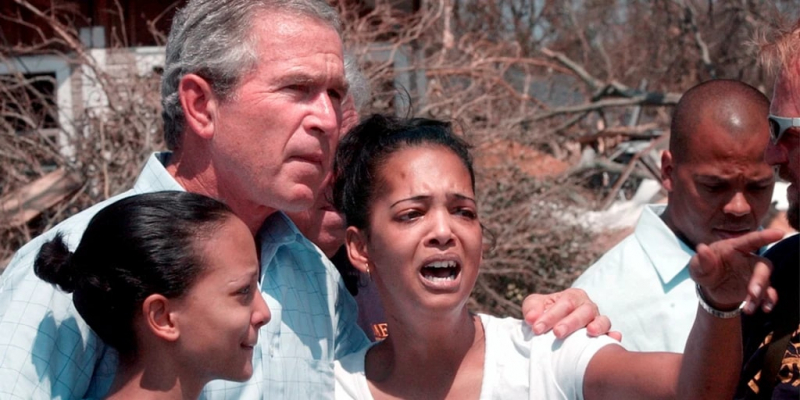
Photo: NBC News 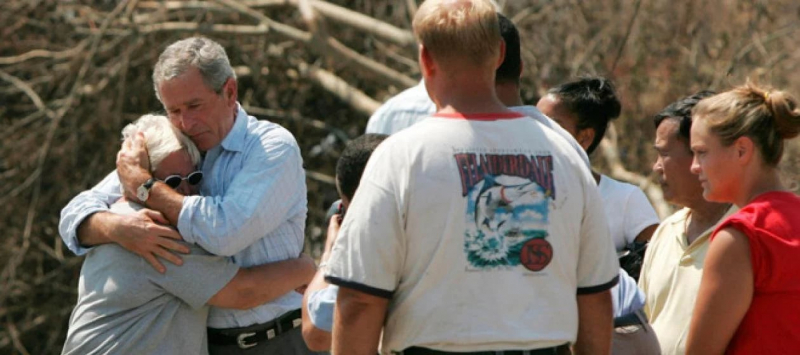
Photo: Reddit -
Bush's odd comments and pronunciation errors are more likely to stick in people's minds than his foreign policy. George W. Bush's remarks, dubbed "Bushisms," were infamous for frequently making the opposite point from what was intended. This is also the ninth fact about George W. Bush in this list. In George W. Bush's public speaking, there are a variety of unorthodox remarks, phrases, pronunciations, Freudian slips, malapropisms, and grammatical or semantic mistakes known as "Bushisms." The term "Bushism" has entered popular mythology and served as the inspiration for a number of websites and books. The former president is frequently parodied using it. Malapropisms, the invention of neologisms, spoonerisms, stunt words, and improper subject-verb agreement are examples of common traits.
Bush is commonly credited with the phrases "They misunderestimated me" and "Rarely is the question asked: Are our students learning?" Bush, for instance, stated on August 5, 2004, "Our enemies are clever and resourceful, and so are we. They and we both never stop imagining new ways to hurt our nation and its citizens. They and we both never stop imagining new ways to hurt our nation and its citizens."
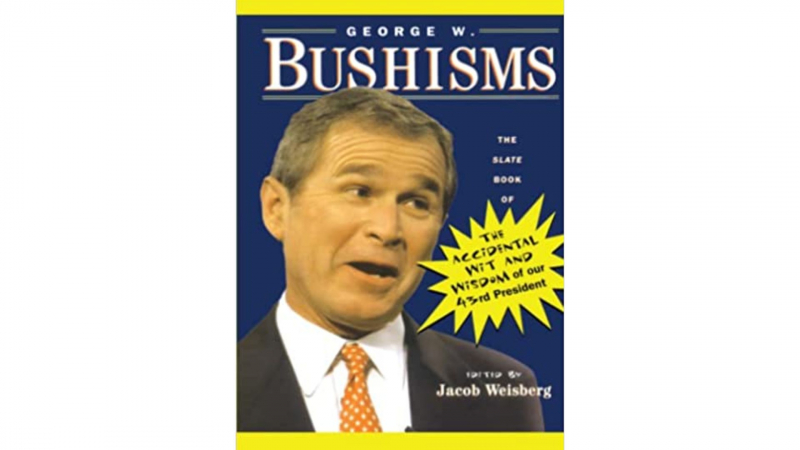
Photo: Amazon.com Photo: NBCUniversal Archives -
After reading Winston Churchill's essay "Painting as a Pastime," Bush took up painting as a hobby after leaving office. There have been still life, dogs, and human subjects. Additionally, he has created pictures of himself and world leaders including Tony Blair and Vladimir Putin. Bush published a book called Portraits of Courage in February 2017 that features images of veterans. His book's net earnings are given to George W. Bush Presidential Center. George Bush created a portrait of Roh Moo-hyun in May 2019 to present to his family on the occasion of the tenth anniversary of his passing.
George W. Bush has exposed himself to be an amateur painter in more recent times. Immigrants to the United States were the subject of his second collection of portraits, which was published in 2020. Immigration "is perhaps the most American of concerns, and it should be one that unites us," he writes in the introduction. Immigration policy under Bush's presidency had a mixed legacy. His administration implemented some of the most strict immigration enforcement, and his plan that would have awarded citizenship to unauthorized immigrants was rejected by the Senate. Bush's previous book concentrated on veterans of war.

Photo: CNN 
Photo: Upworthy












